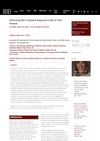 2 citations,
April 2023 in “Journal of the American Academy of Dermatology”
2 citations,
April 2023 in “Journal of the American Academy of Dermatology” Hispanic/Latinx patients with alopecia areata often have it before age 40, with females and certain health conditions like rheumatoid arthritis more commonly affected.
 11 citations,
January 2014 in “International Journal of Trichology”
11 citations,
January 2014 in “International Journal of Trichology” Witch hazel-based hair products improved scalp irritation and were well-tolerated.
 7 citations,
September 2013 in “Current Dermatology Reports”
7 citations,
September 2013 in “Current Dermatology Reports” Some skin medications are safe for pregnant women, but others pose risks or should not be used.
 5 citations,
January 2016 in “Journal of The American Academy of Dermatology”
5 citations,
January 2016 in “Journal of The American Academy of Dermatology” Skin doctors should know about skin and kidney disease links to prevent serious kidney problems.
 27 citations,
December 2005 in “Journal of Cosmetic Dermatology”
27 citations,
December 2005 in “Journal of Cosmetic Dermatology” Niacin derivatives may increase hair fullness in women with hair loss.
 41 citations,
January 2012 in “Journal of Korean Medical Science”
41 citations,
January 2012 in “Journal of Korean Medical Science” Over 60% of Korean military personnel had skin diseases, commonly acne and athlete's foot, linked to service length and stress.
 38 citations,
April 2017 in “Journal of The American Academy of Dermatology”
38 citations,
April 2017 in “Journal of The American Academy of Dermatology” Many skin patients have mental health issues, but few dermatologists are well-versed in treating these conditions.
March 2022 in “JAAD case reports” Accurate diagnosis is crucial for effective treatment of hair loss.
 25 citations,
May 2009 in “International Journal of Dermatology”
25 citations,
May 2009 in “International Journal of Dermatology” About one-third of dermatology patients in Ankara, Turkey use unconventional treatments for skin issues.
 June 1996 in “Archives of Dermatology”
June 1996 in “Archives of Dermatology” Minoxidil, tretinoin, and finasteride may help hair regrowth in mild to moderate androgenetic alopecia.

Metformin can cause rare severe skin reactions.
 8 citations,
July 2020 in “Journal of The American Academy of Dermatology”
8 citations,
July 2020 in “Journal of The American Academy of Dermatology” Patients with Lichen Planopilaris are more likely to have rosacea and skin cancer but less likely to have congestive heart failure, stroke, and glaucoma.
 December 2024 in “Cureus”
December 2024 in “Cureus” Tirzepatide improved symptoms and hair regrowth in a man with folliculitis decalvans.
 42 citations,
August 2013 in “International Journal of Women's Health”
42 citations,
August 2013 in “International Journal of Women's Health” Female pattern hair loss is caused by multiple factors and while treatments like topical minoxidil, hormone therapy, and low-level light therapy can help, none can fully cure it.
 6 citations,
October 2000 in “International Journal of Dermatology”
6 citations,
October 2000 in “International Journal of Dermatology” Preventing hair loss is more effective than regrowth; oral finasteride is a realistic option.
 2 citations,
December 2023 in “JEADV. Journal of the European Academy of Dermatology and Venereology/Journal of the European Academy of Dermatology and Venereology”
2 citations,
December 2023 in “JEADV. Journal of the European Academy of Dermatology and Venereology/Journal of the European Academy of Dermatology and Venereology” The document suggests a new way to categorize skin and mind disorders into two main groups to reduce confusion.
 22 citations,
April 2006 in “Journal of The American Academy of Dermatology”
22 citations,
April 2006 in “Journal of The American Academy of Dermatology” More research is needed to determine if iron deficiency causes hair loss.
 2 citations,
May 2020 in “Konuralp Tip Dergisi”
2 citations,
May 2020 in “Konuralp Tip Dergisi” Some dermatology patients use traditional and complementary medicine, often for acne, and many recommend it, but they need more information about its effects.
 2 citations,
September 2007
2 citations,
September 2007 Surgical hair restoration involves moving hair from a non-balding area to a balding area, with the transplanted hair not subject to male pattern baldness. Medications can slow hair loss and regrow some hair, but successful treatment needs careful planning, skill, and ethical responsibility due to progressive hair loss and limited donor hair.
 25 citations,
May 2012 in “Journal of The European Academy of Dermatology and Venereology”
25 citations,
May 2012 in “Journal of The European Academy of Dermatology and Venereology” Many Korean patients with hair loss, skin allergies, and psoriasis use alternative medicine, but satisfaction is low.
 44 citations,
November 2010 in “Current Opinion in Supportive and Palliative Care”
44 citations,
November 2010 in “Current Opinion in Supportive and Palliative Care” Many patients find hair loss from chemotherapy very distressing, and while treatments like minoxidil and scalp cooling may help, there is no sure way to prevent it.
 9 citations,
May 2021 in “Archives of Dermatological Research”
9 citations,
May 2021 in “Archives of Dermatological Research” Home-based skin care devices are generally safe and effective for hair removal, promoting hair growth, treating wrinkles and acne, but results for psoriasis treatment are mixed.
40 citations,
August 2021 in “JAAD international” Teledermatology became a valuable and convenient tool for skin care during the COVID-19 pandemic.
 July 2023 in “Journal of Cosmetic Dermatology”
July 2023 in “Journal of Cosmetic Dermatology” The September 2023 issue highlights the importance of safety in cosmetic procedures and updates on treatments for acne, rosacea, and hair restoration.
 4 citations,
September 2019 in “Journal of The American Academy of Dermatology”
4 citations,
September 2019 in “Journal of The American Academy of Dermatology” Platelet-rich plasma combined with other treatments improves acne scars better than those treatments alone.
 June 2023 in “Journal of Drugs in Dermatology”
June 2023 in “Journal of Drugs in Dermatology” Doctors should use thorough examinations and more research to better diagnose alopecia in patients with skin of color.
 January 2016 in “Springer eBooks”
January 2016 in “Springer eBooks” Pubertal acne is linked to hormonal changes, affects quality of life, and is treated similarly to adult acne.
1 citations,
June 2023 in “Journal of Patchouli and Essential Oil Products” Patchouli essential oil may help reduce eczema symptoms in infants and toddlers.
19 citations,
January 2019 in “JAAD case reports” A medication for skin rash also unexpectedly treated hair loss in a patient.
 22 citations,
October 2020 in “Anais Brasileiros de Dermatologia”
22 citations,
October 2020 in “Anais Brasileiros de Dermatologia” The Brazilian Society of Dermatology agrees that oral isotretinoin is effective for acne and other skin conditions, and it's safe when monitored, but more research is needed on dosing and duration.


























